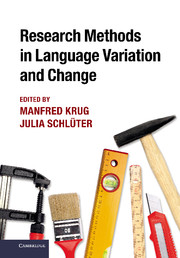Preface
Published online by Cambridge University Press: 05 June 2014
Summary
Synopsis
For several decades, linguistic research has seen an increasing trend towards empirical methodologies. On the one hand, this has led to a shift in linguistic interest away from the study of single example sentences as manifestations of a monolithic grammar and towards an investigation of (synchronic) variation and (diachronic) change on all levels of linguistic organization. On the other hand, this evolution has transformed many strands of linguistics into branches of an objective science and increased the need for falsifiable and, in many cases, quantifiable data. Consequently, the spectrum of methodologies used in contemporary linguistics has considerably broadened and diversified; different strands of variationist linguistics have developed a wide range of useful techniques for data collection, analysis and evaluation. As a result, methodological know-how has become one of the key qualifications for linguists, both newcomers to the discipline and professional practitioners.
However, it is increasingly difficult even for professionals to keep track of the methodological advances in neighbouring fields of linguistic study: most of the discussion in publications and conference meetings revolves around the findings that have resulted from the successful application of research methods. Too little space and time, at least in our view, is devoted to making the methods explicit and to communicating them in a way that would allow others to replicate them. This lack of methodological transparency results in a situation in which empirical studies run the risk of failing to meet two fundamental principles of objective science: reproducibility and falsifiability. Advanced undergraduate and graduate students are faced with a similar problem: BA, MA and Ph.D. theses are expected to involve original research projects demonstrating their authors’ ability to do empirical research, but many students receive little explicit guidance on questions of methodology – at least beyond the immediate field of their supervisor(s).
Information
- Type
- Chapter
- Information
- Research Methods in Language Variation and Change , pp. xxi - xxvPublisher: Cambridge University PressPrint publication year: 2013
